

Group discussion in online statistics courses. I recently played a role in creating online versions of three statistics courses offered through my department.
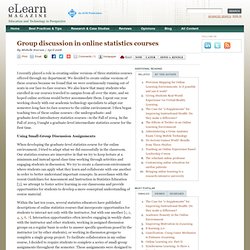
We decided to create online versions of these courses because we found that we were continuously running out of seats in our face-to-face courses. We also knew that many students who enrolled in our courses traveled to campus from all over the state, and we hoped online sections would better accommodate them. Leveraging Student Feedback to Improve Teaching in Web-based Courses. Leveraging Student Feedback to Improve Teaching in Web-based Courses By Sunil Hazari, Donna Schno06/01/99 ##AUTHORSPLIT###- --> Web-based course materials are being used extensively to provide supplementary as well as standalone instruction in educational settings.

One of the most powerful elements of using the Web for teaching is the ability to engage learners in an interactive format. Although there are many technologies available that allow instructors to develop interactive Web course materials and elicit feedback from students, many educators choose to use the Web only for distributing static documents. This severely limits the potential of the Web to improve the teaching/learning process. Feedback and Assessment can be used to monitor student progress, control the pace of learning, and evaluate teaching strategies. Many educators have recognized the potential of using the Internet for instruction. Student Perceptions of Group Work in an Online Course: Benefits and Challenges - ProQuest. Learning Together: Exploring Group Interactions Online: [1] - ProQuest. Educational Technology & Society - 8.pdf. Introduction - sadera_0609.pdf. EJ986884.pdf. "It's Easier to Be Yourself When You Are Invisible": Female College Students Discuss Their Online Classroom Experiences - ProQuest.
Teaching with Technology Collaboratory - Benefits of Using Discussion Boards in Your Classes. The 6 Key Drivers of Student Engagement. 21st Century Curriculum | Feature The 6 Key Drivers of Student Engagement The best way to drive student achievement is to meaningfully connect with students.

The best way to do that is through technology. By Mark A. Edwards04/16/13 The following is an excerpt from the book Every Child, Every Day: A Digital Conversion Model for Student Achievement, published by Pearson. We believe that relevant, personalized, collaborative, and connected learning experiences enhance student engagement, which in turn drives student achievement. Relevant Learning There is a great deal of discussion these days about the need for relevant instruction, so that students can see the value of school. When students are using digital resources, building multimedia projects, collaborating and connecting online, and conducting online research, they are more interested in their schoolwork today, and they feel more connected to what their future holds tomorrow. 00 Front - Onlinecollaborativelearning.pdf. 70282 CH02 GGS - TuOCLCCh2.pdf.
Online Collaborative Learning: Theory and Practice. "Online Collaborative Learning: Theory and Practice" provides a resource for researchers and practitioners in the area of online collaborative learning (also known as CSCL, computer-supported collaborative learning), particularly those working within a tertiary education environment.
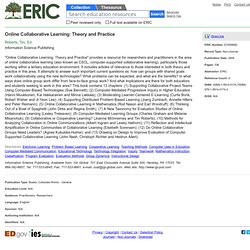
It includes articles of relevance to those interested in both theory and practice in this area. It attempts to answer such important current questions as: how can groups with shared goals work collaboratively using the new technologies? What problems can be expected, and what are the benefits? Collaborative Learning in an Online Environment. Elizabeth Stacey Elizabeth Stacey is a senior lecturer in the School of Scientific and Developmental Studies in the Faculty of Education at Deakin University in Melbourne, Australia.
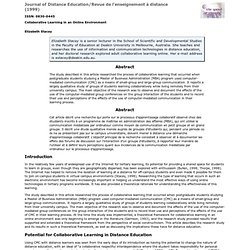
She teaches and researches the use of information and communication technologies in distance education, and her doctoral research explored adult collaborative learning online. Her e-mail address is estacey@deakin.edu.au. Educational Technology & Society - 8.pdf. Feb05_04. Editor’s Note: Collaborative communication tools are not limited to facilitation of learning; they provide opportunities for students to participate in every stage of the education process from goal setting to evaluation.

The lead article in this issue by Daithí Ó Murchú addressed new student roles as self-learner, team member/collaborator, and knowledge manager/leader. He also listed new teacher roles and how these align with, exist in tandem, or overlap student roles. This paper is an excellent example of Murchú’s findings. In this study, the learners collaboratively design their own course, select tools for implementation, participate as learners, and evaluate the outcomes.
Becoming a "Communal Architect" in the Online Classroom - Integrating Cognitive and Affective Learning For Maximum Effect in W. Addressing Student Needs: Teaching on the Internet. Addressing Student Needs: Teaching on the Internet Many faculty members inhigher education are wondering about teaching courses on the Internetsince they have heard and read many things about it, both pro andcon.

This article covers the experiences of a university professorwho has been teaching graduate courses to community college facultyin Florida via this medium. Technological change iswhat many are saying is the only constant in our work today. And,talk about change! I transitioned from a community college presidencyto a university professorship, teaching graduate level online courseson the Internet, in one year. The learning curve wasrather steep when one considers the need to understand thetechnology, and at the same time design all of the course materialsrequired for online instruction before the first course began.
For me, it was fortuitousthat I got involved with the computer-based activities I had beenreading about for several years. CoursePreparation. 00 Front - Onlinecollaborativelearning.pdf. Benefits of a discussion forum. Supporting social awareness in collaborative e-learning - Lambropoulos - 2011 - British Journal of Educational Technology - Wiley Online Library. Using Online Discussion Boards to Enhance Learning in Your Class. Screenshot of sample GoPost discussion board If you are an instructor wanting to engage your students using an online discussion board (GoPost if you’re using Catalyst Tools), you may have questions about benefits and best practices.
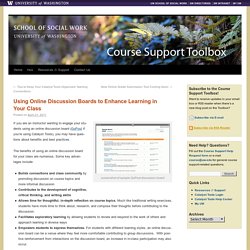
The benefits of using an online discussion board for your class are numerous. Some key advantages include: Builds connections and class community by promoting discussion on course topics and more informal discussionContributes to the development of cognitive, critical thinking, and writing skillsAllows time for thoughtful, in-depth reflection on course topics.
Much like traditional writing exercises, students have more time to think about, research, and compose their thoughts before contributing to the discussion.Facilitates exploratory learning by allowing students to review and respond to the work of others and approach learning in diverse waysEmpowers students to express themselves.
Introduction - sadera_0609.pdf. 70282 CH02 GGS - TuOCLCCh2.pdf. ONLINE DISCUSSION BOARDS ΠFRIEND OR FOE? - 193.pdf. Feb05_04. Teaching with Technology Collaboratory - Promoting Student Collaboration. Considerable research indicates that when students collaborate with one another they...
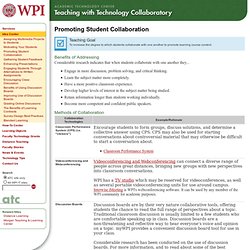
Alavi, M. (1994). Computer-mediated collaborative learning: An empirical evaluation. MIS Quarterly, 18(2), 159-174. Bligh, D.A. (2000). What’s the use of lectures. Borresen, C.R. (1990). Cooper, J., Prescott, S., Cock, L., & Smith, L. (1990). Curtis, D.D. , & Lawson, M.J. (2001). Gokhale, A. (1995). Virtual teams. We live in an era in which the pace of change is accelerating, and competition is increasingly fierce.
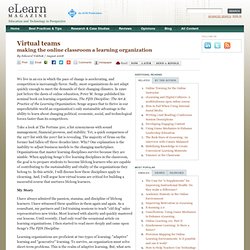
Sadly, most organizations do not adapt quickly enough to meet the demands of their changing climates. In 1990 just before the dawn of online education, Peter M. Senge published his seminal book on learning organizations, The Fifth Discipline: The Art & Practice of the Learning Organization. Senge argues that to thrive in our unpredictable world an organization's only sustainable advantage is the ability to learn about changing political, economic, social, and technological forces faster than its competitors. Take a look at The Fortune 500, a list synonymous with sound management, financial prowess, and stability. Discussion Forum Benefits. Benefits of Online Education : General Discussions Discussions. One of the biggest questions prospective students have about online education is how the virtual classroom actually works.
While there are similarities between the virtual classrooms used in online education, and the brick and mortar classrooms of a traditional university, there are striking differences as well. For example, if you attend a physical campus you will enter the classroom and attend a certain course at a certain time that will be designated to last between one and three hours on average. The instructor of the course will likely lecture for the majority of this time, but there may also be some student participation.
At the end of the class the instructor may assign homework or inform students of upcoming quizzes. But in a virtual classroom the structure is much more open, and there is a far greater degree of flexibility in the lesson plans. Collaborative Learning in an Online Environment. Abstract The study described in this article researched the process of collaborative learning that occurred when postgraduate students studying a Master of Business Administration (MBA) program used computer-mediated communication (CMC) as a means of small-group and large-group communication.
Microsoft Word - Dubikovsky21.doc - 27_Dubikovsky21.pdf. Questions of Culture in Distance Learning: A Research Review. Abstract. A theory of online learning as online participation. Taylor & Francis Online.